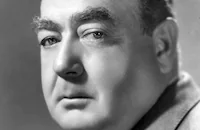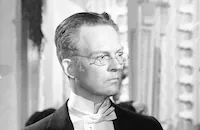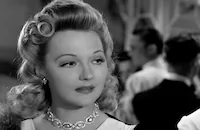The Night Mayor
Cast & Crew
Ben Stoloff
Lee Tracy
Evalyn Knapp
Eugene Pallette
Warren Hymer
Donald Dillaway
Film Details
Technical Specs

Synopsis
Although Bobby Kingston is an honest and effective mayor of a large city, he has offended the city's reformers, who criticize his lively nightlife activities. Kingston, a dandy and a ladies' man, often mixes business with pleasure and would rather catch a new musical show than grapple with the city's budget problems. While a reform committee petitions Lieutenant-Governor Robertson to have the mayor removed from office, Kingston meets a new girl, follies dancer Doree Dawn. When Kingston throws a party at his elegant apartment, Doree arrives with reporter Fred Fields from the Evening Star , a newspaper that does not favor the mayor, so Kingston concocts a fake news story to get rid of Fields. After failing to get Doree to go with him, Fields leaves Kingston's party in anger. Smitten with the young dancer, Kingston ignores the reformers' complaints and takes Doree to parties, fights and night clubs. When Fields, who is in love with Doree and is determined to get her back, goes to Kingston's apartment and threatens to expose their affair in his paper unless he gives her up, Kingston's tough butler and bodyguard, Riley, decides to help his boss by shooting Fields before he gets back to his office. Kingston, however, saves the reporter by having him arrested on phony charges. Meanwhile, Hymie Shane, Kingston's political mentor, having received an ultimatum from Robertson, decides to end the scandal by marrying Doree and Fields. Doree agrees to the plan but objects to telling Kingston that she does not love him, because she does. She is soon convinced, though, that she must make the sacrifice in order to save the mayor's political career. Kingston performs the marriage ceremony himself and although he is sad to have lost his first true love, he knows that his political future is secure.

Director
Ben Stoloff
Cast

Lee Tracy

Evalyn Knapp

Eugene Pallette

Warren Hymer

Donald Dillaway

Vince Barnett

Astrid Allwyn
Barbara Weeks
Gloria Shea
Emmett Corrigan
Tom O'brien
Wade Boteler
Harold Minjir
Wallis Clark
Tammany Young
Crew

Film Details
Technical Specs

Quotes
Trivia
Notes
A memo contained in the file for The Night Mayor in the MPAA/PCA Collection at the AMPAS Library indicates that the AMPP acknowledged that the film was a story about James J. "Jimmy" Walker, who became mayor of New York City in 1925, and who was later the subject of a state-ordered investigation by Samuel Seabury following rumors of corruption. The investigation resulted in charges that Walker was guilty of graft and improper conduct, and on September 1, 1932, after being summoned to the office of Governor Franklin D. Roosevelt, Walker submitted his resignation. The PCA file also contains correspondence indicating that in July 1932 Jason S. Joy of the AMPP warned Columbia studio executive Harry Cohn of the possible legal repercussions that could follow the film's release. Joy also suggested that "great care should be taken in the depiction of the Governor [Roosevelt] of New York, a candidate for the office of President." Joy pointed out that the submitted script implied that the Governor was "working pretty much hand-in-glove with the Mayor and his friends," and urged Cohn to avoid offending Roosevelt by eliminating the part of the Governor. Contemporary reviews of the film indicate that the scene involving the Governor was retained for the released picture. According to correspondence between the Will H. Hays and Joy, Columbia vice-president Walter Wanger agreed to assume the risk of libel suits and criticism stemming from the film's portrayal of New York City's mayor. On August 17, 1932, after viewing The Night Mayor, Joy wrote a letter to Cohn praising the film and stating that it would be "interesting to watch the reaction of the New York City Mayor, his friends and opponents." In November 1932, the Variety review criticized what it called the film's "tactless [exploitation of] a public character who at the minute is the center of a public debate." The Variety review also pointed out that the film opened at New York's Globe theater, which was known to show first run films that were rejected by the top theaters. The 1957 film Beau James, directed by Melville Shavelson and starring Bob Hope, was also based on the political career of James J. Walker.












